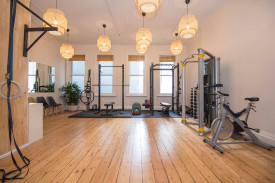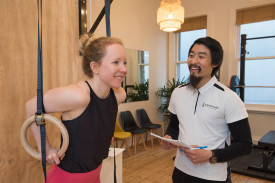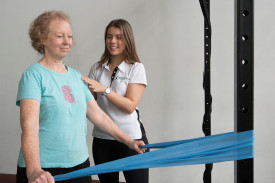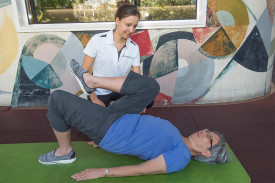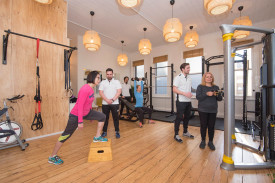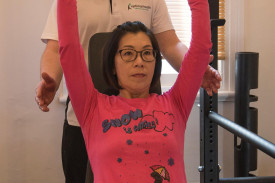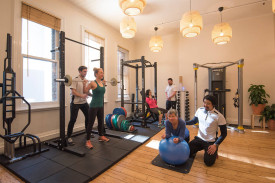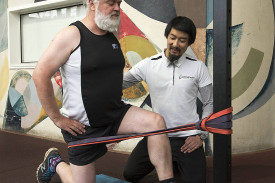We understand that the pain, stiffness and swelling from arthritis prevents you from engaging in the life you want. The good news is, correctly prescribed exercise can combat the symptoms of arthritis by decreasing pain and increasing function, building stability and strength around affected joints, easing joint stiffness, facilitating joint nourishment, and improving flexibility. This allows you to confidently get back to doing the things that are important to you. In addition, if you are considering surgery and have not tried targeted exercise, best-evidence strongly recommends holding off and giving exercise a go.
“…I began this work because of suffering from severe osteoarthritis in several areas of my body and am now mostly pain-free due to having strengthened the relevant muscle groups.”
Megan, 57yrs
Going through cancer can be brutally challenging on your body, and mental health. In the past it may have been advised to rest exclusively following a cancer diagnosis, but now evidence shows that carefully controlled supervised exercise with an Accredited Exercise Physiologist is recommended as standard best-practice care.
Exercise as a concurrent treatment can increase your chances of surviving, and thriving, after cancer. During treatment, exercise can increase your ability to tolerate aggressive treatments whilst also decreasing the occurrence and severity of side-effects. It also protects against cancer reoccurrence.
We work together with your specialists and care team to make sure that your exercise is carefully designed and controlled depending on your goals, and what you can tolerate at any given time in your journey.
Telehealth (online video exercise sessions) are also available if more suitable for your circumstances.
The benefits of seeing an exercise physiologist:
Fatigue management
Mood benefits and stress release
Better tolerated cancer treatments and decreased side effects
Increased survival rates
Protective against reoccurrence
Reduced anxiety and depression
Having some control in your treatment journey
Increased:
Muscle mass and strength
Bone mass
Cardiorespiratory (aerobic) fitness
Physical function to do meaningful activities
Range of motion
Immune function
Chemotherapy completion rates
Our exercise physiologists can get you moving whilst working around any personal barriers and/or physical limitations that have made it hard for you to exercise in the past.
Whether you are at risk, or you have already been diagnosed with diabetes, correctly prescribed exercise will improve glucose control, decrease the risk of heart disease, help you to lose weight, and lower your blood pressure. We often find that after consistent training, medication doses can be decreased or even eliminated. Exercise can also reduce the incidence of developing T2DM by 60% in people at risk.
Once perceived as simply a distraction from negative thoughts, exercise is now recognised as an evidence-based, fundamental component of treatment for a range of mental illnesses.
Although not a cure, exercise should be seen as a key tool in the toolbox for people living with mental illness. Even one workout a week is known to have great benefits.
We will guide you to:
Manage your individual symptoms
Improve your mood
Counteract weight gain from medication side effects
Improve physical health
Improve sleep quality
Set realistic goals for exercising that fit in with your lifestyle
Be your best self, and live a richer life
You’ve seen a host of physios, chiros, osteos and massage therapists in the past. You’ve tried a variety of manual therapies, dry needling, taping, ultrasound and pilates. Things feel better after a day or so, then reliably, your pain returns. Maybe you’ve tried a few “rehab exercises” in the final minutes of your consult but weren’t sure if you were doing them right or how to progress them. You may even have had surgery. It hurts even more to think of all the money, time and energy spent on your long-term pain. You’re frustrated, have no confidence in your body, and are starting to lose hope.
Our understanding of long-term pain has evolved considerably over the years. We now know that pain is multifactorial and we need to consider so much more than just the painful region in question. Individualised exercise is essential for managing persistent pain and getting you back to the meaningful activities in your life.
We will:
Show you how “movement is medicine” for your pain
Help you understand your pain and what contributes to it
Reverse the vicious cycle of pain → lack of movement → deconditioning/weakness → more pain → repeat
Decrease pain and increase function
Help you return to doing things that are important to you, so you live a better life
“Like many rehabilitation reviews and stories, I ‘enjoyed’ a journey that took me through neurosurgeons, nauseating pain management programs and endless pathology. My journey stopped at Optimal Health Exercise Physiology and the strengthening/physical confidence began. Give it a go! Do the exercises! You have nothing to lose only the potential for improvement. Ask for Sarah she is ace. I think Yujin is an undercover wizard.”
James
Are you post-menopausal, have an inactive lifestyle, or have low Vitamin D? These are just some of the risk factors for osteoporosis. Osteoporosis occurs when bones lose minerals more quickly than the body can replace them, leading to a loss of bone density. The most common affected areas are the hips, spine, wrists, and arms.
The good news is, the correct kind of exercise can greatly reduce the rate of bone loss. On the other hand, an overzealous exercise program that is built up too quickly, or is too high impact may increase the risk of injury and fractures.
Osteoporosis usually has no symptoms until a fracture occurs – this is why it is often called the “silent disease”. As bones become thinner, even a sudden strain, or a minor bump or fall can cause a serious fracture.
Bones, just like muscles, are adaptable structures. Exercise can help bones modify their density, shape and size so they become stronger. This can prevent injuries. Exercise also increases muscle strength and improves balance which further reduces the risk of injury or falls.
We will help you to:
Start at a safe and appropriate level for your current fitness level
Maintain your existing bone density, and build new bone tissue
Improve your overall strength, balance and coordination
Decrease fracture and falls risk
Get back to doing the things that are important to you – with confidence!
Not every woman with PCOS will have every symptom, and each woman will be individual in her experience. Likewise, exercise plans should be individualised to target your specific presentation. You may be dealing with weight gain, anxiety and depression, acne, hirsutism, fertility problems and associated health conditions. These can affect your mood, self-esteem, and sense of self. This can be confronting especially if you do not have the support you need to manage these symptoms. Exercise plays a vital role in improving the health, symptoms, and fertility of those with PCOS.
We will guide you to:
Manage your weight
Improve your body composition (less fat, more muscle)
Reduce insulin resistance, keeping your glucose levels stable
Stabilise your mood
Reduce your risk of associated health conditions such as type 2 diabetes and cardiovascular disease
Improve sleep quality
Improve cholesterol levels
If desired, prepare your body for pregnancy
Confidently manage your symptoms for life
“Working with the guys at Optimal Health has made me realize that the health issues that one gathers with age don’t have to have a big impact on your daily life. I suffer from rheumatoid arthritis. The symptoms associated with this are general tiredness, muscle weakness, and joint inflammation, pain and stiffness.
I have permanent joint damage in one knee and one wrist. There is no cure but I have found staying physically active is the key, and it can reverse some of the effects. Taking part in strength training has given me better levels of fitness, greater muscle strength, and puts me in a better mood.
When I moved to Melbourne I needed to find health professionals who understood what I needed to stay healthy and mobile, just like I had from where I came. Yujin and his team at Optimal Health were recommended to me, and I love it.
They’re great people to work with – I look forward to my sessions. Being pro-active about taking up exercise under the guidance of professionals is a wise move. I know from experience you’re never too old to start and to get benefit from it!”
Liz, 60yrs
"Regular visits to Optimal Health have enabled me to enjoy life. Before, shortness of breath meant I could not walk up hills or stairs, had to rest while cleaning the bathroom or doing the vacuuming. I barely left the house - certainly not if I had to walk any distance. Now, I find vacuuming a stroll around the house. Is that a plus? Maybe not, but walking up the stairs at the theatre or cinema certainly is. So is walking for 10 minutes to the tram stop or to a restaurant.
I have the confidence to go to gym on my own and follow the program devised for me. I know it’s devised just for me. No-one else at the gym is doing the same sequence of exercises.
Exercise physiology has contributed more to my enjoyment of everyday life than any other intervention including medication."
Rosemary, 62 yrs
“I came to Optimal Health with a rare set of symptoms including exertional myopathy (exercise intolerance), muscle weakness and constant muscle pain. Small amounts of exercise such as walking for 15 minutes pushed my body into rhabdomyolysis and near-medical emergency.
My neuromuscular doctors hadn’t found much in terms of diagnosis and offered no advice on symptom management or possible relief so I scoured medical journals and found possible hope in diet modification and exercise. In trying to find someone to help with possible exercise treatments I was told by some that they couldn’t help, others recommended treatments that would have clearly led to hospitalisation and I was feeling quite stressed about my options and whether I would just be injured more by treatments.
On recommendation of a friend I got in touch with Optimal Health and had my first appointment with Nik. On the rollercoaster up until then, he is the first health professional that actually listened to my experiences and description of what was happening to my body. He first helped with mindset and seeing that there was a possibility of improvement and that whilst there were lots of unknowns we could just start at (extremely!) mild exercise and see if we could get my body used to that.
Fast forward about four months and I can do so much more than I was able to before. We started off mild and have been slowly able to push my body to do a little bit more and then a little bit more. When I go to a grocery store I no longer have to map out every thing I will buy and in what order in advance to ensure that I actually can make it through without additional pain! I am able to meet pretty much all daily needs and live a relatively normal life and I am hoping with time and continuing on this approach that I can get back to more demanding physical activity like hiking and dancing. The biggest thank you to Nik!”
Melissa
“From the first time I met Jason there was a resonance of being in the company of a specialist with such integrity, compassion and wisdom. I had already been through 10 months of rehabilitation and from the first meeting he immediately complimented how far I had already come. I shared with him I had been through 2 brain surgeries for a benign orbital sphenoid meningioma and still had some residual tumour and various challenges as a result.
Jason empowered me to believe in myself and reflected so much of what I was living that had already brought me back from what I describe as a pit. During the sessions I had with Jason I regained more in the time with him than in the other rehabilitation processes due to his ability to align to my way of being and his support.
Sessions with Jason supported my Me-Ness returning through believing in myself again and the missing me that was previously so fatigued, dizzy and overwhelmed by challenges has now got more confidence again.
The exercise was fun too and it blew me away how quickly I advanced through what previously overwhelmed me.
For me within I felt the need to be supervised by what I felt is an expert and searched the internet where the company Jason works for most resonated then I went through the process to book in and attend the sessions where I could. I was beyond grateful to Jason being the practitioner for me as was my partner Mike as it was truly life changing and continues to be.
For me he was the missing link and now I feel I’ve been put back together even though I still live with the ongoing reality of a residual tumour, a seizure disorder and a brain injury that is a moment by moment process of balance.”
Elisabeth

